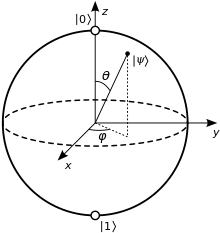பயனர்:Surya Prakash.S.A./குவாண்டம் கணினி

குவாண்டம் விசையியலின் நிகழ்வுகளான குவாண்டம் சிக்கல் (Quantum entanglement), குவாண்டம் மேற்பொருந்துதல் (Quantum superposition) போன்றவற்றை தரவுகளைக் கொண்டு கணிப்பீடு செய்வதற்கு நேரடியாகப் பயன்படுத்திக் கொள்ளும் கணிப்பீட்டுக் கருவியே குவாண்டம் கணினி (Quantum computer) எனப்படும்.
A quantum computer is a device for computation that makes direct use of quantum mechanical phenomena, such as superposition and entanglement, to perform operations on data. Quantum computers are different from traditional computers based on transistors. The basic principle behind quantum computation is that quantum properties can be used to represent data and perform operations on these data.[1] A theoretical model is the quantum Turing machine, also known as the universal quantum computer. Quantum computers share theoretical similarities with non-deterministic and probabilistic computers, like the ability to be in more than one state simultaneously.
Although quantum computing is still in its infancy, experiments have been carried out in which quantum computational operations were executed on a very small number of qubits (quantum bits). Both practical and theoretical research continues, and many national government and military funding agencies support quantum computing research to develop quantum computers for both civilian and national security purposes, such as cryptanalysis.[2]
Large-scale quantum computers could be able to solve certain problems much faster than any classical computer by using the best currently known algorithms, like integer factorization using Shor's algorithm or the simulation of quantum many-body systems. There exist quantum algorithms, such as Simon's algorithm, which run faster than any possible probabilistic classical algorithm.[3] Given enough resources, a classical computer can simulate an arbitrary quantum computer. Hence, ignoring computational and space constraints, a quantum computer is not capable of solving any problem which a classical computer cannot.[4]
On May 25th, 2011 it was announced that Lockheed Martin Corporation has entered into an agreement to purchase the world's first commercial quantum computing system from D-Wave Systems Inc.[5]
மேற்கோள்[தொகு]
- ↑ "Quantum Computing with Molecules" article in Scientific American by Neil Gershenfeld and Isaac L. Chuang
- ↑ Quantum Information Science and Technology Roadmap for a sense of where the research is heading.
- ↑ Simon, D.R. (1994). "On the power of quantum computation". Foundations of Computer Science, 1994 Proceedings., 35th Annual Symposium on: 116–123.
- ↑ Nielsen, Michael A. Quantum Computation and Quantum Information. p. 202.
{{cite book}}: Unknown parameter|coauthors=ignored (help) - ↑ "D-Wave Systems sells its first Quantum Computing System to Lockheed Martin Corporation". 2011-05-25. பார்க்கப்பட்ட நாள் 2011-05-30.
